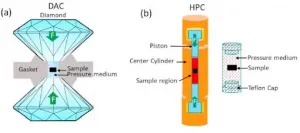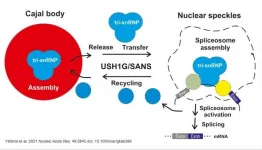(Press-News.org) A new University of Arizona Health Sciences study found women on hormone therapy were up to 58% less likely to develop neurodegenerative diseases including Alzheimer's disease, and reduction of risk varied by type and route of hormone therapy and duration of use. The findings could lead to the development of a precision medicine approach to preventing neurodegenerative diseases.
The study, published in Alzheimer's & Dementia: Translational Research & Clinical Interventions, found that women who underwent menopausal hormone therapy for six years or greater were 79% less likely to develop Alzheimer's and 77% less likely to develop any neurodegenerative disease.
"This is not the first study on the impact of hormone therapies on neurodegenerative disease reduction," said Roberta Diaz Brinton, PhD, director of the UArizona Center for Innovation in Brain Science and senior author on the paper. "But what is important about this study is that it advances the use of precision hormone therapies in the prevention of neurodegenerative disease, including Alzheimer's."
Hormone therapy is the most effective treatment for the symptoms of menopause, which can include hot flashes, night sweats, insomnia, weight gain and depression. During the study, Dr. Brinton and the research team examined the insurance claims of nearly 400,000 women aged 45 and older who were in menopause.
They focused on the effects of individual U.S. Food and Drug Administration-approved hormone therapy medications, including estrogens and progestins, and combination therapies on neurodegenerative diseases. Additionally, they evaluated the impacts of the type of hormone therapy, the route of administration - oral vs. through the skin - and the duration of therapy on the risk of developing disease.
They found that using the natural steroids estradiol or progesterone resulted in greater risk reduction than the use of synthetic hormones. Oral hormone therapies resulted in a reduced risk for combined neurodegenerative diseases, while hormone therapies administered through the skin reduced the risk of developing dementia. Overall risk was reduced the most in patients 65 years or older.
Additionally, the protective effect of long-term therapy lasting longer than one year on Alzheimer's, Parkinson's disease and dementia was greater than with short-term therapy of less than one year.
"With this study, we are gaining mechanistic knowledge. This reduction in risk for Alzheimer's disease, Parkinson's and dementia means these diseases share a common driver regulated by estrogen, and if there are common drivers, there can be common therapies," said Dr. Brinton, who has researched neurodegenerative diseases and the aging female brain for more than 25 years. "The key is that hormone therapy is not a treatment, but it's keeping the brain and this whole system functioning, leading to prevention. It's not reversing disease; it's preventing disease by keeping the brain healthy."
Dr. Brinton's co-authors include first author Gregory L. Branigan, PhD, an MD-PhD student in the UArizona College of Medicine - Tucson; Kathleen Rodgers, PhD, associate director of translational neuroscience at the Center for Innovation in Brain Science and professor of pharmacology in the UArizona College of Medicine - Tucson; postdoctoral research associate Yu Jin Kim, PhD, in the Center for Innovation in Brian Sciences; and former postdoctoral research associate Maira Soto, PhD.
Dr. Brinton recently co-authored another paper led by researchers at Weill Cornell Medicine and published in Scientific Reports. Those findings demonstrated that the menopausal transition stage has pronounced effects on the brain's structure, connectivity and energy metabolism, and provides a neurological framework for both vulnerability and resilience.
Neurodegenerative diseases associated with aging are a major public health concern as the proportion of populations aged 65 and older increase. There is no known cure for Alzheimer's disease, which affects more than 5.5 million people in the United States.
INFORMATION:
A team of researchers at the University of Cambridge has developed a new experimental and theoretical platform to study how viruses evolve while spreading within an organism.
In the study, published in PHYSICAL REVIEW X, the researchers used experimental data and simulations of a phage-bacteria ecosystem to uncover that viral expansions can transition from 'pulled' - where the expansion is led by the pioneering viral particles at the very edge of the population, to 'pushed', where the expansion is driven by viruses arising behind the front and within the infected region.
Crucially, pushed waves are known ...
Commonly-used household products should carry a warning that they increase the risk of asthma, according to a new evidence review.
New research conducted by Smartline, a research project funded by the European Regional Development Fund, finds evidence that a group of chemicals found in a wide range of products in people's homes increases the risk of asthma. Authors conclude that labelling should reflect this risk, and warn people to ventilate their homes while using them.
The research reviewed 12 studies into Volatile Organic Compounds (VOCs), which are emitted as gases from certain solids or liquids. VOCs are emitted by a wide array of products, including some that are widely used as ingredients in household products. ...
The city park may be an artificial ecosystem but it plays a key role in the environment and our health, the first global assessment of the microbiome in city parks has found.
The study, published in END ...
The discovery of iron-based superconductors with a relatively high transition temperature Tc in 2008 opened a new chapter in the development of high-temperature superconductivity.
The following decade saw a 'research boom' in superconductivity, with remarkable achievements in the theory, experiments and applications of iron-based superconductors, and in our understanding of the fundamental mechanism of superconductivity.
A UOW paper published last month reviews progress on high-pressure studies on properties of iron-based superconductor (ISBC) families.
FLEET PhD student Lina Sang (University of Wollongong) was first author on the Materials Today Physics review paper, investigating ...
Movies and television often show romance sparking when two strangers meet. Real-life couples, however, are far more likely to begin as friends. Two-thirds of romantic relationships start out platonically, a new study in Social Psychological and Personality Science finds.
This friends-first initiation of romance is often overlooked by researchers. Examining a sample of previous studies on how relationships begin, the authors found that nearly 75 percent focused on the spark of romance between strangers. Only eight percent centered on romance that develops among friends over time.
"There are a lot of people ...
Destroying tropical ecosystems and replacing them with soybeans and other crops has immediate and devastating consequences for soybeans, according to new peer-reviewed research in the journal World Development. With 35.8 million hectare currently under soy cultivation in Brazil, extreme heat--which adjacent tropical forests help keep in check--has reduced soybean income by an average of approximately US$100 per hectare per year.
The study, Conserving the Cerrado and Amazon biomes of Brazil protects the soy economy from damaging warming, shows that protecting the Amazon and Cerrado can prevent the sort of high temperatures that damages the productivity of crops--estimated to cost the sector US$3.55 billion.
Another recent study found annual agricultural losses associated ...
PULLMAN, Wash. - After cutbacks and layoffs, remaining employees were more likely to feel they were treated fairly if the companies invested in them - and morale was less likely to plunge, according to new research.
Those investments can include training for workers, team-building exercises or improving company culture. Even keeping workloads manageable after layoffs can help employees' job attitudes, according to the Journal of Organizational Behavior study.
"Whenever possible, cost-cutting is best combined with signals that people remain the firm's most prized asset," said Jeff Joireman, the study's co-author and a professor in Washington State University's Carson College of Business.
Researchers reviewed 137 previous studies examining job attitudes before, during and after cost-cutting ...
If we pay closer attention to how birds, rabbits and termites transform their local living spaces in response to varying climate conditions, we could become much better at predicting what impact climate change will have on them in future.
This is according to a group of researchers* from the Universities of Montana and Wyoming in the United States, the University of Tours in France and Stellenbosch University (SU) in South Africa. They examined how animals' ability to respond to climate change likely depends on how well they modify their habitats, such as the way they build nests and burrows.
The findings of their study were published recently in the high-impact journal Trends in Ecology and Evolution.
"It's crucial that we continuously improve our ability to predict and mitigate the ...
Human Usher syndrome (USH) is the most common form of hereditary deaf-blindness. Sufferers can be deaf from birth, suffer from balance disorders, and eventually lose their eyesight as the disease progresses. For some 25 years now, the research group led by Professor Uwe Wolfrum of the Institute of Molecular Physiology at Johannes Gutenberg University Mainz (JGU) has been conducting research into Usher syndrome. Working in cooperation with the group headed up by Professor Reinhard Lührmann at the Max Planck Institute for Biophysical Chemistry in Göttingen, his team has now identified a novel pathomechanism leading to Usher syndrome. They have discovered that the Usher syndrome type 1G protein SANS plays a crucial role in regulating ...
Turning away from fossil fuels is necessary if we are to avert an environmental crisis due to global warming. Both industry and academia have been focusing heavily on hydrogen as a feasible clean alternative. Hydrogen is practically inexhaustible and when used to generate energy, only produces water vapor. However, to realize a truly eco-friendly hydrogen society, we need to be able to mass-produce hydrogen cleanly in the first place.
One way to do that is by splitting water via "artificial photosynthesis," a process in which materials called "photocatalysts" leverage solar energy to produce oxygen and hydrogen from water. However, the available photocatalysts are not yet where they need to be to make solar-powered water splitting economically feasible and scalable. ...



